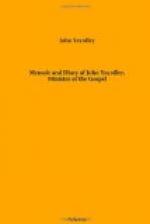FROM HIS ENTRANCE ON THE MINISTRY IN 1815, TO HIS COMMISSION TO RESIDE IN GERMANY IN 1820.
1815.—After the long season of depression through which John Yeardley passed, as described in the last chapter, the new year of 1815 dawned with brightness upon his mind. He now at length saw his spiritual bonds loosed; and the extracts which follow describe his first offerings in the ministry in a simple and affecting manner.
1 mo. 5.—The subject of the prophet’s going down to the potter’s house opened so clearly on my mind in meeting this morning that I thought I could almost have publicly declared it; but not feeling that weight and certainty which I had apprehended should accompany the performance of such an important act, I was afraid of imparting that to others which might be intended only for my own instruction; and so it has ended for the present. But I am thankful in hoping that I am come a little nearer to that state of resignation which was so beautifully exemplified by our great Pattern of all good, who when He desired the bitter cup might pass from Him, nevertheless added, “Not my will, but thine be done.” And if I am at all acquainted with my inward feelings, I trust I can in some degree of sincerity say that my heart desires to rejoice more in the progress of this state of happy resignation, than at the increase of corn, wine, or oil.
He first opened his mouth in religious testimony in the First Month of this year. The occurrence seems to have taken place in his own family; it yielded him a “precious sense of the Divine Presence.” He began to preach in public a few months later, but not without another struggle against the heavenly impulse.
The friendship which Joseph Wood entertained for John Yeardley strengthened with revolving years. When he visited Barnsley, he was accustomed to lodge at his house; and writing to him in the year 1811, about a public meeting which he felt concerned to hold, he says, “I can with freedom write to thee, feeling that unity with thy spirit which preserves us near and dear to each other, and in which freedom runs.”
In the Fourth Month of this year, when Joseph Wood received a certificate to visit some of the midland counties, J.Y. felt desirous “of setting him a little on his way.”
On the 14th, he says, we went to Woodhouse, where we had a meeting, and my friend was enabled to speak very closely to the states of many present. When in the meeting, I felt a very weighty exercise to attend my mind with an intimation publicly to express it. But this exposure I dared not yield to, under an apprehension that it might be wrong in me, considering the occasion on which I had come out; but truly I left the place under a burden which I was scarcely able to bear.
It was on the 20th of the Fourth Month that he began to speak in public as a minister of the Gospel. He thus records the event:—




